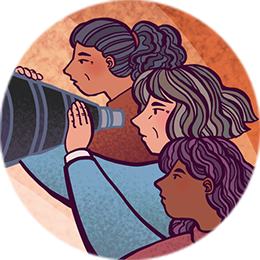Bladder Cancer in Women
Some people refer to bladder cancer as an "old man's cancer." After all, it is the 4th leading type of cancer in men. However, about 20,000 women are diagnosed with bladder cancer each year.1
While bladder cancer is not among the top 10 most common cancers in women, scientists estimate that more than 19,000 women will be diagnosed with the condition in 2021. Plus, roughly 5,000 women will die from bladder cancer in 2021.1
Differences in bladder cancer diagnosis in women
Even though men are more likely to develop bladder cancer, women usually have a much worse prognosis at the time of diagnosis. Scientists are not exactly sure why women are usually diagnosed after the cancer has progressed. Some possible reasons include:1,2
- Hormones – Estrogen, one of the 2 main sex hormones in women, might play a role. At first, it might help protect against bladder cancer, but later, it can quicken the tumor's growth.2
- Confusion about symptoms – Many symptoms of bladder cancer are similar to those of bladder infections. This includes blood in the urine, pain while urinating, increased urination frequency, and urinating at night.
- Ignoring blood in the urine – Blood in the urine can occur during menstruation or menopause. However, this is often the first sign of bladder cancer, yet women may not be alarmed enough to see a doctor.
- Lack of awareness – Many people still think of bladder cancer as an older man's disease. The average age at diagnosis in men is 73. This lack of awareness may lead women to dismiss their symptoms and concerns.
However, if bladder cancer is present, not seeing a doctor gives the tumor time to continue growing. You should see a doctor if you have blood in the urine that does not go away within a few days. Bladder cancer can affect women of any age and is usually treatable when caught early.3,4
Bladder cancer risk factors in women
Smoking is the biggest risk factor for bladder cancer. Other risk factors for women include:4
- A family history of bladder cancer;
- Some types of chemotherapy drugs;
- Drinking well water contaminated with arsenic;
- Having chronic urinary tract infections.
You can reduce your risk of developing bladder cancer by quitting smoking and limiting exposure to manufacturing chemicals.5
Your own best advocate: YOU
Cancer is scary. When first told you have cancer, you will likely feel overwhelmed. Your emotions might jump from upset to panic to anger to depression. And, you can go through these emotions in a matter of minutes. Give yourself time to process the feelings and work through them. Once you do, be ready to start your journey against bladder cancer. Here are some ways you can advocate for yourself along the way:6
Learn about your illness. Talk to your doctor and ask questions. Learn as much as you can through reputable websites, books, medical libraries, and support organizations.
Request a referral to a specialist. A urologist might not be the best type of doctor to treat bladder cancer. Instead, look for a urologic oncologist who can order tests and recommend treatments. Treatments include chemotherapy, radiation therapy, immunotherapy, and surgery. Surgery can involve removing a portion of or all of your bladder.
Bring a trusted friend or relative with you to appointments. Dealing with a serious diagnosis like bladder cancer can be overwhelming, and you could forget what the doctor said after your appointment. A second person can help by taking notes and then remind you of important information later.
Research different treatments for bladder cancer. Listen carefully to the treatment options your doctor presents. Ask questions. Discuss the pros and cons of each and potential side effects. Discuss your choices and decision with your family.
Take advantage of resources. There are many resources available to people going through cancer treatment. Some organizations clean your house once a month, others might bring you meals, and some might provide transportation to medical visits. Do not feel embarrassed asking for help. The people who run these organizations have often recovered from cancer themselves and know what you are going through. They are not there to embarrass you – they are there to help.
Practice kindness and patience
Be gentle and forgiving with yourself. Some people with cancer feel guilty that they cannot care for their families. However, you might need to let others care for you during your cancer treatment. Remember, you are not alone on this journey.

Join the conversation